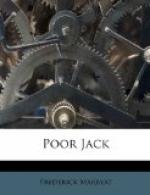house) offered to speak to her, she turned away from
him in most ineffable disdain. Now my father was
at that time about thirty years of age, and thought
no small beer of himself, as the saying goes.
He was a tall, handsome man, indeed, so good-looking
that they used to call him “Handsome Jack”
on board of the “Druid,” and he had, moreover,
a pigtail of most extraordinary size and length, of
which he was not a little proud, as it hung down far
below the waistband of his trousers. His hair
was black and glossy, and his lovelocks, as the sailors
term the curls which they wear on their temples, were
of the most insinuating description. Now, as
my father told me, when he first saw my mother with
her sky-scraping cap at the back of her head, so different
from the craft in general, he was very much inclined
to board her; but when she boomed him off in that
style, my father, who was quite the rage and fancy
man among the ladies of Sally Port and Castle Rag,
hauled his wind in no time, hitching up his white trousers
and turning short round on his heel so as to present
his back to her whenever they happened to meet.
For a long time he gave her a wide berth. Now
this fact of my father returning her disdain had the
usual effect. At first she was very savage, and
when she spoke of him to Lady Hercules, she designated
him as “that proud coxswain, who seemed to think
himself a greater man than Sir Hercules himself—with
his filthy pigtail, indeed!” My father also,
when he spoke of her to the boat’s crew, termed
her “that proud —— of a lady’s
maid,” the word not mentionable being both canine
and feminine. Thus matters went on for some time,
until my mother, by a constant survey of my father’s
handsome proportions, every day thought him to be
a more proper man, and a few advances on her part
at last brought them to a mutual understanding.
CHAPTER TWO
My Father does what
most Sailors do—he makes a foolish Marriage,
one of the Consequences
of which is brought to Light at the End of
the Chapter.
I have observed at the finale of my first chapter,
that at last my mother and father came to a good understanding;
but at the same time Madam Araminta (for so my mother
insisted upon being called) took good care to let
my father understand that she considered that she was
lowering herself by surrendering up her charms to a
captain’s coxswain. She informed him that
her father might be said to have been royally connected,
being a king’s messenger (and so, indeed, he
might be considered, having been a twopenny postman),
and that her mother had long scores against the first
nobles in the land (she was a milk-woman), and that
she had dry-nursed a young baronet, and was now not
merely a ladies’ maid, but a lady’s
laides’ maid. All this important and novel
communication sunk deep in my father’s mind,
and when he heard it he could hardly believe his good
fortune in having achieved such a conquest; but, as




